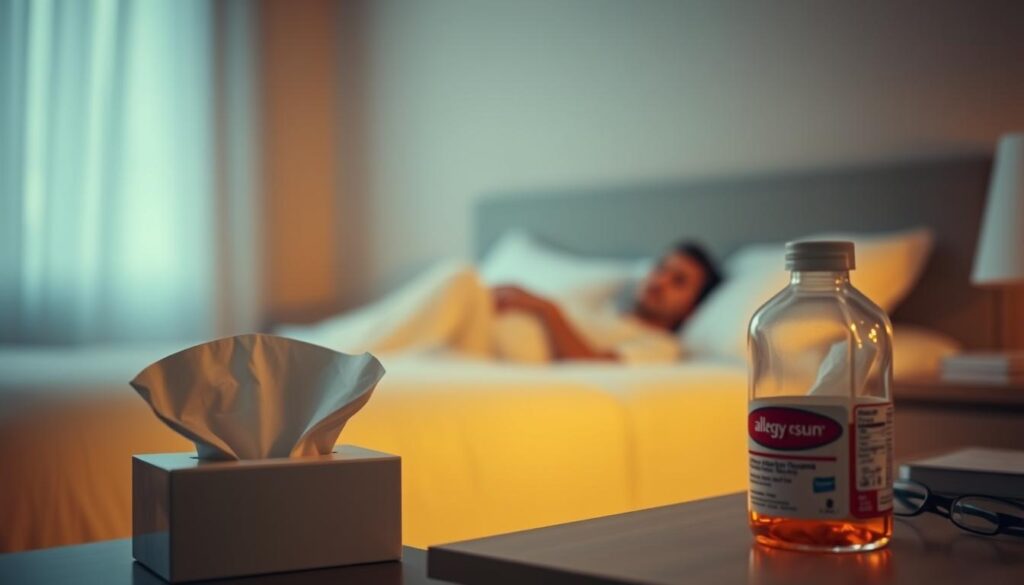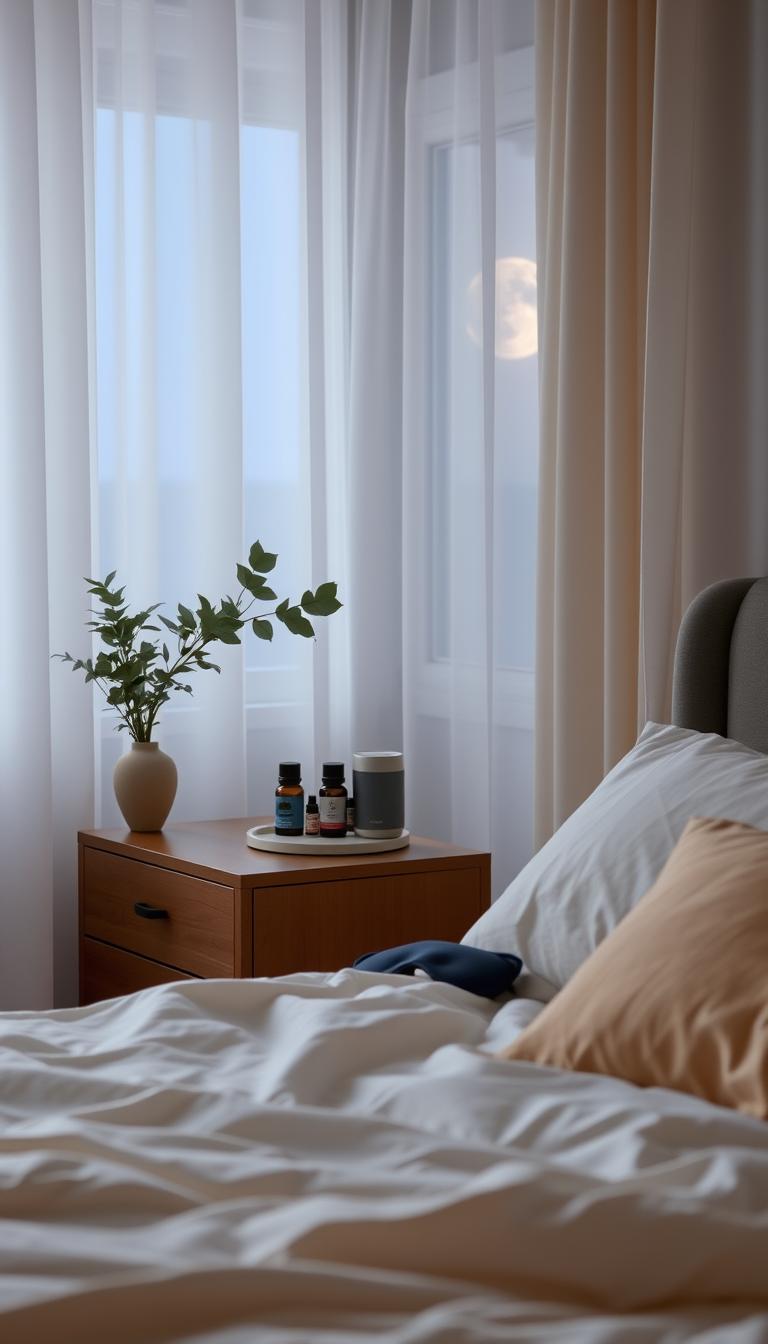
One in five people in the U.S. have allergic rhinitis. It’s not just a springtime problem. Seasonal allergens can make your bedroom a snore zone.
Your mattress might have 10 million dust mites. These tiny creatures feed on your skin cells. They cause inflammation, clog nasal passages, and lead to breathing problems at night.
Allergy season isn’t just about daytime issues. Swollen nasal tissues and congestion can block airways. This makes snoring worse.
If you wake up gasping or feel tired despite sleeping, it might be allergies. Your immune system’s reaction to pollen or dust could be the cause. This guide will explain how seasonal triggers and allergens create this problem. It will also show how to solve it.
Key Takeaways
- Allergies swell nasal passages, making snoring more likely.
- Old mattresses trap dust mites that worsen nighttime breathing.
- Air purifiers cut allergens like pollen and mold spores.
- Sleeping upright can ease congestion-related snoring.
- Chronic snoring may signal sleep apnea, a serious health risk.
The Connection Between Seasonal Allergies and Snoring
Allergic reactions can make you sneeze and disrupt your sleep. If you have snoring and allergies together, there’s a strong link. Seasonal allergies swell your nasal passages, blocking airflow.
This forces you to breathe through your mouth. This change increases the risk of throat vibrations, leading to snoring. Studies show people with allergies are twice as likely to snore.
How Allergies Trigger Snoring
Pollen or dust mites can trigger an immune response. This releases histamines, which inflame nasal tissues and narrow airways. Over 19 million Americans with allergic rhinitis face this challenge every night.
Research in the Journal of Allergy and Clinical Immunology shows nasal steroids help. But they don’t fully solve sleep apnea. Mouth breathing during blocked nose episodes is a key snoring trigger.
Common Seasonal Allergens That Affect Your Sleep
- Pollen: Tree, grass, and weed pollens peak in spring and fall, worsening nasal congestion.
- Dust Mites: Year-round triggers that thrive in bedding, worsening during allergy seasons.
- Mold Spores: Thrive in humid environments, common in spring and summer.
These allergens create a cycle: congestion → mouth breathing → worsened snoring and allergies symptoms. A 2011 study found CPAP machines with full-face masks help allergy sufferers breathe better through blocked noses.
Identifying If Your Snoring Is Allergy-Related
Ask yourself:
- Does snoring peak during high pollen counts?
- Do you experience congestion, itchy eyes, or a runny nose?
- Does snoring ease when using allergy medication?
If yes, allergy-related snoring is likely. Morning headaches, daytime fatigue, or insomnia linked to allergy seasons are red flags. A 2018 CDC report shows allergy sufferers are 2.34x more likely to snore. Track symptoms alongside pollen forecasts to pinpoint triggers.
Allergies and Snoring: Seasonal Fixes
Seasons change, and so do our allergies. Pollen, dust, and mold can make us snore at night. Here are some seasonal fixes to help you sleep better.

- Medication Timing: Take antihistamines with decongestants 30 minutes before bed. This clears your nasal passages. Use Claritin or Zyrtec to reduce swelling.
- Air Quality Adjustments: Use HEPA air purifiers in your bedroom. Close windows when pollen is high. Shower before bed to remove allergens.
- Bedding Care: Wash sheets in hot water (over 130°F) every week. Use mite-proof covers. Replace pillows every 1–2 years to avoid dust.
- Outdoor Timing: Check pollen forecasts before going outside. Plan activities after rain when pollen counts are lower. Use apps like Pollen.com for updates.
For snoring all year, use humidifiers to keep airways moist. Try saline sprays like NeilMed’s Neti Pot to clean your nose. For bad cases, talk to a doctor about Balloon Sinuplasty. It opens blocked sinuses quickly.
Start medications 2–3 weeks before allergy season to reduce symptoms by 30%. Vacuum monthly with a HEPA-filter vacuum to cut dust mites in carpets by 90%.
Small changes today can lead to better sleep tomorrow. Start with one idea and add more. Your sleep and your partner’s will improve.
Natural Remedies to Reduce Allergy-Related Snoring
Make your bedroom a safe space from allergies. Use allergy-proof mattress and pillow covers to keep dust mites away. Keep the air moist with a humidifier to stop dry noses.
Add a HEPA air purifier to catch pollen and dander. This helps with allergy management and keeps the air clean.

- Wash bedding weekly in hot water to remove allergens.
- Avoid drying clothes outdoors to prevent pollen accumulation.
- Raise your head 3–4 inches with pillows to ease congestion.
Eat foods that fight inflammation. Include apples and onions, which have quercetin. This helps lower histamine levels.
Drink ginger tea or honey in warm water to soothe your airways. Stay away from dairy and alcohol before bed to relax your throat.
Try steam inhalation with eucalyptus oil to clear your nose. Butterbur supplements and sea buckthorn may also help with allergies. Acupuncture can ease congestion too. But always talk to a doctor before trying new herbal treatments.
Sleep on your side to avoid throat blockage. Use a body pillow to stay in place. For bad cases, try FDA-approved devices that strengthen your tongue. These can help with airway collapse. Also, keep a regular sleep schedule to reduce stress and inflammation.
Medical Interventions and When to Seek Professional Help
When allergy relief isn’t found at home, doctors can help. They offer treatments for seasonal allergies and snoring. These include medicines and special therapies for long-lasting symptoms.

- Antihistamines: They help with itching and swelling. You can buy some over-the-counter, but stronger ones need a doctor’s prescription.
- Nasal corticosteroids: These sprays reduce swelling in your nose. They take a few days to work but are safe for long use.
- Decongestants: Sprays like oxymetazoline give quick relief. But use them for no more than 3 days to avoid getting worse congestion.
For long-term relief, immunotherapy is an option. It takes years to work but can lessen your allergic reactions. For serious blockages, doctors might suggest nasal dilators or devices like CPAP machines for sleep apnea. Surgery can fix problems like a crooked septum or polyps.
Get help right away if you notice:
- Snoring that keeps you or your partner awake at night
- Gasping for air while you sleep
- Feeling tired during the day even after sleeping 7-8 hours
- High blood pressure from using too many decongestants
If your symptoms last more than 2-3 weeks, or if home remedies cause side effects like nosebleeds, see a doctor. Allergy tests can find out what’s causing your problems. This helps your doctor give you the right treatment. Don’t ignore long-lasting congestion. It could mean you have something serious like nasal polyps or asthma. Getting help early can make a big difference for your allergies and sleep.
Conclusion: Creating Your Year-Round Strategy for Allergy and Snoring Relief
Managing allergies and snoring needs a plan that fits you. Start by tracking your symptoms. Use a journal or app to see when allergies get worse and how they affect your sleep.
Knowing when pollen counts are high or mold grows helps you prepare. Use Allermi nasal spray to clear your nose before congestion starts. This can help you breathe better at night and reduce snoring.
Try snoring solutions like bedroom air filters, elevated pillows, and hypoallergenic bedding. Allermi’s formula works faster than single-ingredient sprays. It can help with sleep apnea by reducing congestion.
If you use CPAP therapy, make sure your nasal passages are clear. This avoids resistance from the machine. Adjust your routine with the seasons. Spring might need more outdoor allergy care, while winter’s dry air requires more hydration.
Regular visits to your healthcare provider are crucial. Allergy testing can find hidden triggers, and sleep studies can uncover sleep apnea. Up to 40% of Americans have allergic rhinitis, and ignoring symptoms can lead to serious health problems.
Small changes, like showering before bed or using dehumidifiers, can stop congestion. This prevents snoring and restless sleep at night.
Year-round relief comes from natural remedies, medical tools, and lifestyle changes. Allergy-induced snoring doesn’t have to happen. Stay proactive to keep your sleep quality and health in check.
Better breathing at night means sharper days. It also lowers risks of heart disease or diabetes linked to poor sleep. Your strategy should change with the seasons and new treatments. Start these steps today for better sleep and a healthier tomorrow.












